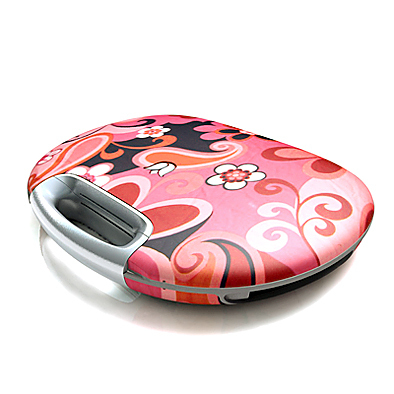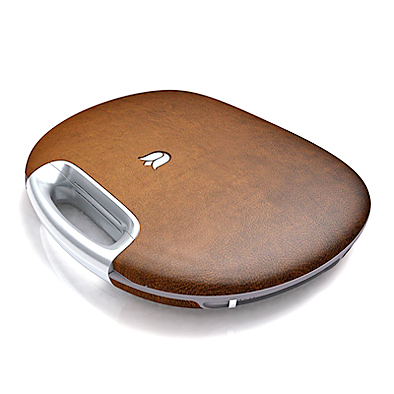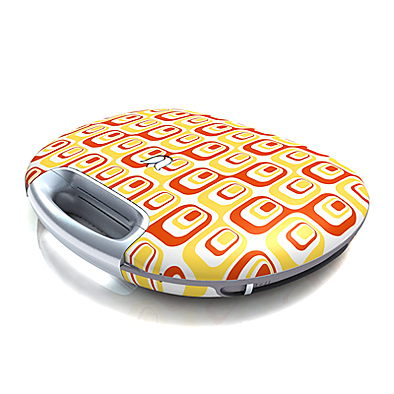Technological innovations often come camouflaged. Rarely do they come in floral prints. That is the case -- literally the case -- with a new manufacturing process called EXO overmolding system technology that turned plenty of heads at the recent CeBit fair in Hannover, Germany.
The technology makes it possible to incorporate fabrics, leather and other materials into the casings of laptop computers, cellphones and more. And it's a technology that early adapters such as Dutch computer manufacturer Tulip hope will create a market for "lifestyle laptops."
The company's coming line of machines, appropriately dubbed "E-Go" laptops, will hit store shelves in October of this year. They look more like a lady's handbag than a traditional (boring?) black or silver laptop, but pack all the power of their more stylistically stoic cousins: an AMD Turion 64 bit processor, a 100GB hard drive, built-in wireless LAN, etc. What they have that portables to this point have not had, the company believes, is style.

PHOTOS COURTESY OF TULIP AND MICROSOFT
"For years laptops have been differentiated by electronic capabilities," said Tony Frencham, global business director at Inclosia Solutions, a business unit of the Dow Chemical company that specializes in developing enclosures. "The housing was often designed for basic protection with very limited aesthetic appeal. We believe the E-Go will be the first of many devices to use fashion as a major focus for consumer satisfaction."
In fact, the trend towards paying more attention to aesthetics has already begun. Inclosia collaborated with Microsoft on a limited, leather-clad edition of its Intellimouse Explorer wireless optical mouse. And companies like Apple, while not using natural materials, have long paid particular attention to the exterior design of their machines.
One of those designs -- Apple's old clam-shell-shaped iBook laptops -- can be seen in the E-Go laptop. It's a similar shape as the old iBook and, like it, has a built-in handle at the hinge. The handle on the E-Go even doubles as the hinge.

Inclosia has gone a step further than Apple has been able to go by using natural materials like fabrics and leathers in its EXO manufacturing process. Another patented process that Inclosia began late last year, called EXO Mix, can incorporate wood and metal into casing designs. The handle on the E-Go, for example, is available in a natural wood. Tulip even has a limited-edition E-Go laptop that is encrusted with over 80 carats of microscopically cut diamonds. It costs 230,000 euros (NT$9.4 million) and looks like a sparkly black toilet seat. And, yes, it will be technologically obsolete in two years.
Of course it's always been possible to make computer casings out of these types of materials. The problem was that it's been impossible to do so in mass production. Previous leather-encased electronics products were made so after rolling off the assembly line. EXO, Dow Chemical believes, changes the rules of the manufacturing game.
In coming years, industry-watchers say, there might well be a revolution in personal electronics, with snake-skin cell phones and hardwood laptops.

They liken it to the revolution in car design. Before the 1940s, it was hard to find an automobile that wasn't black. In the early years of the industry, sales were made based on the model's reliability. It took years for cars to gain a reputation for dependability. But once they had, consumers began demanding that their cars fit their lifestyles both in function and form -- wagons, trucks and little red racers.
Likewise, the personal computer market has reached a point of maturity where the machines can no longer compete based on what's inside them. Consumers don't care so much whether their wireless LAN is 802.11A, B or G, so long as it comes in zebra stripes (yes, E-Go will have one).
Frencham at Inclosia said that, like the auto industry, design aesthetics is the front at which computer manufacturers will battle for consumers' dollars. In a survey commissioned by the company, he said, "we found that 72 percent of Inclosia's target audience see authentic materials as making their consumer electronic devices a lot more stylish."

The point, he said, is to create an emotional bond between consumers and the products they buy. Wristwatches are the perfect example.
Watches long ago reached a point where they were assumed to be accurate. They've since transcended their original role as timepieces to become jewelry, even treasured heirlooms.
While today's computers will still be tomorrow's doorstops as the technology inside them ages (even diamond-encrusted ones), style sense is something Tulip is taking to the bank.
The company says its own surveys have found that not only do authentic materials make personal electronics more personal -- "lifestyle accessories" they called them -- consumers are also willing to pay a premium for them; as much as US$140 for authentic materials include in a laptop design and US$60 for the same in cellphone designs.
One thing Tulip may not have banked on in making a laptop that looks like a bag is that nearly all laptop users like to keep their laptop in, well, a bag. More than simply offering an easy means to carry their machine, a bag helps protect it during the daily bump and grind. And if you're willing to take the risk in order to show off your "lifestyle accessory" you'll have to overcome another problem: Where to put the power cord? Guess you'll need a bag after all -- at least until everything goes wireless.
For more information about EXO overmolding system technology, visit the Dow Chemical Company's Web site at http://www.dow.com/Homepage/index.html. For more information on the Tulip E-Go laptop computer, visit their Web site at http://www.tulip-ego.com.

One of the biggest sore spots in Taiwan’s historical friendship with the US came in 1979 when US president Jimmy Carter broke off formal diplomatic relations with Taiwan’s Republic of China (ROC) government so that the US could establish relations with the People’s Republic of China (PRC). Taiwan’s derecognition came purely at China’s insistence, and the US took the deal. Retired American diplomat John Tkacik, who for almost decade surrounding that schism, from 1974 to 1982, worked in embassies in Taipei and Beijing and at the Taiwan Desk in Washington DC, recently argued in the Taipei Times that “President Carter’s derecognition

This year will go down in the history books. Taiwan faces enormous turmoil and uncertainty in the coming months. Which political parties are in a good position to handle big changes? All of the main parties are beset with challenges. Taking stock, this column examined the Taiwan People’s Party (TPP) (“Huang Kuo-chang’s choking the life out of the TPP,” May 28, page 12), the Democratic Progressive Party (DPP) (“Challenges amid choppy waters for the DPP,” June 14, page 12) and the Chinese Nationalist Party (KMT) (“KMT struggles to seize opportunities as ‘interesting times’ loom,” June 20, page 11). Times like these can

June 23 to June 29 After capturing the walled city of Hsinchu on June 22, 1895, the Japanese hoped to quickly push south and seize control of Taiwan’s entire west coast — but their advance was stalled for more than a month. Not only did local Hakka fighters continue to cause them headaches, resistance forces even attempted to retake the city three times. “We had planned to occupy Anping (Tainan) and Takao (Kaohsiung) as soon as possible, but ever since we took Hsinchu, nearby bandits proclaiming to be ‘righteous people’ (義民) have been destroying train tracks and electrical cables, and gathering in villages

Dr. Y. Tony Yang, Associate Dean of Health Policy and Population Science at George Washington University, argued last week in a piece for the Taipei Times about former president Ma Ying-jeou (馬英九) leading a student delegation to the People’s Republic of China (PRC) that, “The real question is not whether Ma’s visit helps or hurts Taiwan — it is why Taiwan lacks a sophisticated, multi-track approach to one of the most complex geopolitical relationships in the world” (“Ma’s Visit, DPP’s Blind Spot,” June 18, page 8). Yang contends that the Democratic Progressive Party (DPP) has a blind spot: “By treating any